创意阅读2 Unit9-12翻译
二册第九单元 课文翻译及课后练习答案

In-Class ReadingTranslation 课文译文青年人的消费行为1 研究市场营销的人很想了解什么样的产品在年轻人市场上会好销。
同时,充分了解年轻人对其他人,如父母亲,的影响也很重要。
实际上,与年青人作为某些商品的主要购买者的地位相比,研究市场营销的人更感兴趣的是他们对别的购买者的影响力。
2 年轻人是如何花钱的呢?男女青少年把大部分的钱花在衣服,光碟、立体声音响设备、娱乐和旅游上。
青年女性把大部分的钱化在化妆品上,其次是衣服和首饰。
青年男子把大部分的钱化在体育用品、照相机、光碟、立体声音响设备、自行车、鞋子、牛仔裤、乐器和电子游戏上。
3 青少年,作为高消费社会的成员,越来越注意新产品和新品牌。
他们是天生的试用者,会花好多小时为自己购物。
4 除了他们对市场的直接影响外,年青人还间接地影响着他们父母对商品品牌的选用。
例如,研究发现,四分之三的青少年会影响他们父母的购物决定。
在购买重要物件时,他们最大的影响在于决定过程中的最初阶段,是在诸如产品的样式、颜色和品牌等审美方面的考虑时影响最大,但在购物的地点、时间、及花多少钱方面则影响力最小。
苹果电脑公司的研究表明,十几岁的青少年在家庭购买电脑的决策方面正发挥着影响。
因此,公司在最近一次介绍产品型号时利用了深受年青人喜爱的当代流行歌曲电台和电脑杂志,以便鼓励青少年去说服他们的父母亲买这种新产品。
5 随着双职工家庭的大量增加,青少年越来越多地帮父母购买食品及别的东西。
例如,有一项研究发现,百分之八十的青少年“大量地参与”家庭的食物采购。
KRAFT公司意识到了年轻人在购买食品杂货方面的重要性,并在音乐电视节目,网站,青少年杂志及当代流行歌曲电台上做广告,突出介绍含有KRAFT产品的食谱。
与广告宣传相配合,KRAFT公司还编写了一套有关“食品购买经验”的学习资料,让家政学老师分发给学校里的青少年。
6 因此,从间接影响父母购买决策的角度看,青少年市场显然占据一个重要的地位。
新视野创意阅读2翻译9-12

这能力便消失了?这就是人们有时说的“第六感觉”。事实上很清楚,我们还有个感觉,但没
被开发出来。第六感的说法常被嘲弄,只在傻乎乎的影片里看得见。但如果人们以科学的方
式来对待这个想法,那么其可能性是真实而又极为令人激动的。
布罗索发现一位盲女能用鼻尖或左耳垂“看”东西。—束亮光突然照到她耳朵上,她会把头
扭开,似有疼痛感。1956 年,一位苏格兰盲学生学习识别不同的彩色光线,学会能捡起几
英尺之外的色彩鲜艳的东西。1960 年一个医疗组测试一位弗吉尼亚州女孩,发现即使给她
眼睛蒙上绷带,贴上胶布,她还是能辨别颜色,识读少部分印得大的字。可能的例子数以千
们一边。老师还得了解她这份工作的方方面面。要是老师不合格或对自己这门课不
懂,学生不可能相信她的能力,我想我说的是学生还是对老师有信任感。
罗恩:我同意。
劳拉:她还得有条不紊,有自信心,不然她会管不住学生。孩子们说话,瞎混,课堂便成了
他们消磨时光的地方。其实,大多数孩子不喜欢没纪律的课堂。他们需要引导。大多数孩
话,我们并不满意这类课,虽然我们喜欢去。你明白我的意思吗?
罗恩:我想我懂你的意思。
劳拉:有时,你遇到的老师真够严厉的,让人受不了,学生们还是喜欢她,因为他们学得辛
苦,也学到了东西。他们也就接受这些规矩,不笑也不胡闹,因为他们知道她很认真。能跟
她长知识。你怎么看?同意我的观点吗?
罗恩:我同意你的观点。你说的全是实话。人与人不同,连下课后的老师与上课时的老师都
师都看不见。
盲童用耳朵、舌头和脚尖“看”的事说明人体内没有特别的感应细胞在起作用。但看的
大学英语创意阅读2 课文翻译
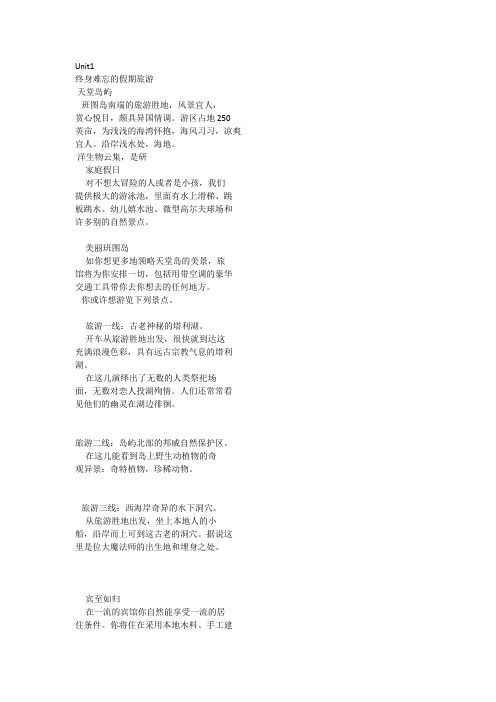
Unit1终身难忘的假期旅游天堂岛屿班图岛南端的旅游胜地,风景宜人,赏心悦目,颇具异国情调。
游区占地250 英亩,为浅浅的海湾怀抱,海风习习,凉爽宜人。
沿岸浅水处,海地。
洋生物云集,是研家庭假日对不想太冒险的人或者是小孩,我们提供极大的游泳池,里面有水上滑梯、跳板跳水、幼儿嬉水池、微型高尔夫球场和许多别的自然景点。
美丽班图岛如你想更多地领略天堂岛的美景,旅馆将为你安排一切,包括用带空调的豪华交通工具带你去你想去的任何地方。
你或许想游览下列景点。
旅游一线:古老神秘的塔利湖。
开车从旅游胜地出发,很快就到达这充满浪漫色彩,具有远古宗教气息的塔利湖。
在这儿演绎出了无数的人类祭祀场面,无数对恋人投湖殉情。
人们还常常看见他们的幽灵在湖边徘徊。
旅游二线:岛屿北部的邦威自然保护区。
在这儿能看到岛上野生动植物的奇观异景:奇特植物,珍稀动物。
旅游三线:西海岸奇异的水下洞穴。
从旅游胜地出发,坐上本地人的小船,沿岸而上可到这古老的洞穴。
据说这里是位大魔法师的出生地和埋身之处。
宾至如归在一流的宾馆你自然能享受一流的居住条件。
你将住在采用本地木料、手工建造的单人套间内。
这些单人套间会为你营造“回归自然”的真切氛围。
让你一分钱当两分钱花好的旅游胜地常常让普通工薪家庭消费不起。
可我们作为新的旅游景点,老板更关心让游客感到宾至如归,让游客高兴,而不仅仅是赚钱。
这次包价旅游活动是特价优惠。
我们知道你们愿意游览以上所列景点,其费用已包含在度假费用中。
这意味着你一到达此地,不用再花一分钱。
不要再犹豫!马上订票。
“终身难忘之旅”,莫失良机。
我太激动了,跑回家告知家人。
家人都说这是我们度假的理想之地。
然而就在订机票前一天,我在地方小报上读到—篇小文章,写的就是这个地方。
写文章的记者去参加了假日之旅,发现旅游指南虽未撒谎,其描述却大为失真。
“不堪回首”的假日——海滨流浪汉的栖身之地一个岛屿不错,这是个岛屿,但天堂在哪儿这个修建一半的“旅游胜地”位于印度洋中部的一块荒礁石上,坐落在海湾边上,并无海滩,整日被刺骨的寒风袭击,使你感到台风倒成了清爽的微风。
大学英语创意阅读第二册课文译文翻译
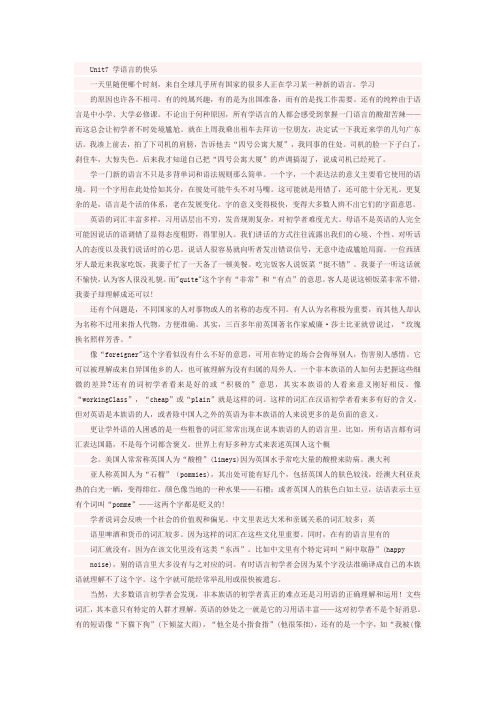
Unit7 学语言的快乐一天里随便哪个时刻,来自全球几乎所有国家的很多人正在学习某一种新的语言。
学习的原因也许各不相司。
有的纯属兴趣,有的是为出国准备,而有的是找工作需要。
还有的纯粹由于语言是中小学、大学必修课。
不论出于何种原因,所有学语言的人都会感受到掌握一门语言的酸甜苦辣——而这总会让初学者不时处境尴尬。
就在上周我乘出租车去拜访一位朋友,决定试一下我近来学的几句广东话。
我凑上前去,拍了下司机的肩膀,告诉他去“四号公寓大厦”,我同事的住处。
司机的脸一下子白了,刹住车,大惊失色。
后来我才知道自己把“四号公寓大厦”的声调搞混了,说成司机已经死了。
学一门新的语言不只是多背单词和语法规则那么简单。
一个字,一个表达法的意义主要看它使用的语境。
同一个字用在此处恰如其分,在彼处可能牛头不对马嘴。
这可能就是用错了,还可能十分无礼。
更复杂的是,语言是个活的体系,老在发展变化。
字的意义变得极快,变得大多数人辨不出它们的字面意思。
英语的词汇丰富多样,习用语层出不穷,发音规则复杂,对初学者难度尤大。
母语不是英语的人完全可能因说话的语调错了显得态度粗野,得罪别人。
我们讲话的方式往往流露出我们的心境、个性、对听话人的态度以及我们说话时的心思。
说话人很容易就向听者发出错误信号,无意中造成尴尬局面。
一位西班牙人最近来我家吃饭,我妻子忙了一天备了一顿美餐。
吃完饭客人说饭菜“挺不错”。
我妻子一听这话就不愉快,认为客人很没礼貌。
而"quite"这个字有“非常”和“有点”的意思。
客人是说这顿饭菜非常不错,我妻子却理解成还可以!还有个问题是,不同国家的人对事物或人的名称的态度不同。
有人认为名称极为重要,而其他人却认为名称不过用来指人代物,方便准确。
其实,三百多年前英国著名作家威廉·莎士比亚就曾说过,“玫瑰换名照样芳香。
”像“foreigner"这个字看似没有什么不好的意思,可用在特定的场合会侮辱别人,伤害别人感情。
创意阅读 生词表

College English Creative Reading----Book TwoGlossaryabound v. 大量存在;丰富(Unit 1)abuse v. 滥用,妄用(Unit 14)accept v. 接受,认可,同意(Unit 9)accepted a. 被接受的;被承认的;被认为正确的(Unit 16) accommodate v. 向......提供住处(或膳宿)(Unit 14) accusation n. 指控,控告(Unit 10)acre n.英亩(Unit 1)actually ad. 实际上(Unit 9)adapt v. 使适应;把......改做他用(Unit 6,12)admit v. 承认,供认(事实、错误等)(Unit 16)adviser n.顾问,劝告者(Unit 17)agony n. (极度的)痛苦;折磨(Unit 20)analyst n.分析者(Unit 8, 19)appalled a.被吓坏的(Unit 2)apparently ad.表面上地;貌似(真实)地(Unit 8) applicant n.申请人(Unit 5,19)approach v.向......靠近;接近( Unit 17)architect n.建筑师;设计师(Unit 8)aspect n.方面(Unit 6, 19)associated a. 与......有联系的(Unit 11)athlete n. 运动员,体育家(Unit 15)attitude n.态度;看法(Unit 17)automatically ad.不假思索地;习惯性地(Unit 9)avenue n.林荫道(Unit 13)balancing a. 保持平衡的(Unit 9)bald a. 秃头的(Unit 6)bandage n. 绷带;包扎带(Unit 10)barrier n. 障碍物;妨碍因素(Unit 4)basis n. 基础;根据(Unit 19)benefit n.益处,好处(Unit 5, 8)beware v. 谨防,当心(Unit 18)biased a.有偏见的,偏心的(Unit 8)blame v. 归咎于;把......归咎于(Unit 20)blasted a. 被摧毁的(Unit 1)bless v. (上帝)保佑,赐福于(Unit 15)blessing n. 幸事(Unit 6)blindfold n. 蒙眼的布(或绷带)(Unit 10)booming v. 发出沉沉的、有回响的声音(Unit 6)borrow v. 借,借入(Unit 12)boulevard n. 林荫大道(Unit 13)braille n.布莱叶点字法(Unit 10)brainwave n. 脑(电)波(Unit 18)brochure n.小册子(Unit 1)budget v.编预算(Unit 8)bullet n. 枪弹,子弹(Unit 3)bureaucracy n.官僚政治;官僚主义(Unit 2) cajole v.哄骗,劝诱(Unit 2)canal n.运河(Unit 13)candidate n.投考者;申请求职者(Unit 19) cardboard n.薄纸板,卡纸板(Unit 14) carefree a. 无忧无虑的(Unit 2) carriageway n.一侧车行道(Unit 13)cater v.满足(Unit 5)cavern n. 大洞穴,大山洞(Unit 1)chaotic a. 混乱的,一团糟的(Unit 13) charm n.随身护符(Unit 11)cheap a.无很大价值的(Unit 12)chip n.油炸土豆条(Unit 20)chorus n. (歌的)叠句,合唱句(Unit 6) circumstance n.条件,情况(Unit 18)clasp v.抱紧;紧握(Unit 4)cleverest a. 最聪明的(Unit 9)colleague n. 同事,同僚( Unit 19) colloquial a. 用于口语的;口语体的(Unit 7) compartment n. (列车车厢的)隔间(Unit 4) compensate v.补偿,赔偿(Unit 3,10) competence n. 能力;胜任,称职(Unit 19) complimentary a. 赞美的;恭维的( Unit 7) compulsory a.强制的;必须做的(Unit 2) confident a. 确信的;有信心的(Unit 9) consume v. 耗费;消费;消耗(Unit 14) contact n.接触;联系;交往,交际(Unit 19) contentedly ad. 满足地,满意地(Unit 3) contributor n.捐献者,捐款人(Unit 5) convey v. 传达,表达(Unit 7)cooperative a.配合的(Unit 2)cope (with) v.对付,(妥善)处理(Unit 4) crow n. 乌鸦(Unit 17)crushed a.极度拥挤的(Unit 4)cunning a.狡猾的,狡诈的(Unit 17)curb n.路缘围栏(Unit 5)currently ad. 当前(Unit 19)custom n. 习惯;风俗;惯例(Unit 15)dart n. 猛冲,急驶(Unit 17)dart n. 镖,飞镖(Unit 19)debt n.债务;欠款(Unit 16)dedicated a.献身的(Unit 6)deluxe a.高级的;豪华的;奢华的(Unit 1)denial n.否定;否认(Unit 11)depressed a. 沮丧的,抑郁的(Unit 20)derive v.取得,得到(Unit 7)despair n.绝望(Unit 2)determined a. 决意的;已决定了的(Unit 7)differing a. 不同的,相异的(Unit 10)dignified a.(举止、态度的)庄严的,端庄的(Unit 8) dinosaur n. 恐龙(Unit 13)diploma n.毕业文凭;学位证书(Unit 19)disappear v.失踪,消失(Unit 12, 20)disaster n. 灾难,祸患;大不幸(Unit 3)dishonest a.不诚实的,不正直的;欺骗性的(Unit 15) dismay n. 失望,沮丧;惊愕(Unit 5)dominate v. 处于支配地位,拥有优势(Unit 2)drift v. 随意(或无目的地)移动(Unit 3)drought n. 长期干旱;旱灾(Unit 1)dual a.双的;两重的;双重的(Unit 13)effectively ad. 实际地(Unit 2)elbow n.肘(Unit 4)eldest a.最年长的;排行第一的(Unit 16)elective n. 选修课程(Unit 19)elite n. [总称]杰出人物,掌权人物(Unit 8) embarrassing a. 受窘的;令人局促不安的(Unit 15) ember n.余火未尽的煤块(或木块)(Unit 11) employee n.受雇者,雇员(Unit 13)enable v.使能够;使成为可能(Unit 19) encouragement n. 鼓励(Unit 5)ensuring a. 确定的,确信的(Unit 14)entertained a. (人)感到愉快的;得到娱乐的(Unit 16) enthusiastic a. 热心的;热烈的;极感兴趣的(Unit 9) epidemic n.(流行病的)传播,流行(Unit 18) escape v.逃跑;逃走(Unit 4)excavator n.挖土者;发掘者(Unit 13)exceed v.超过;胜过(Unit 14)excuse n.借口,理由(Unit 20)exotic a. 异乎寻常的;奇异的;吸引人的(Unit 1) expressionless a.无表情的(Unit 4)expressive a. 富于表情(或表现力的)(Unit 15) facilities n.设备;设施(Unit 5, 13)fairy n.小精灵;仙人,仙子(Unit 11)fake n. 假货,赝品(Unit 12)fascinated a. 着迷的,被强烈吸引的(Unit 18)fault n.(对错误所负的)责任;过失(Unit 20)feather n.羽毛(Unit 17)fireplace n. 壁炉;火炉(Unit 11)fist n. 拳(头)(Unit 15)flat a. 平的,平坦的(Unit 18)flattery n. 奉承;恭维话(Unit 17)flowing a. 流动的(Unit 6)former a.以前的,从前的(Unit 20)fossil n. 化石(Unit 14)foul v. 犯规(Unit 11)fragile a. 易碎的,易损坏的(Unit 14)frantically ad.发狂似地;紧张纷乱地(Unit 2)frog n. 蛙(Unit 18)frosty a.霜冻的;结霜的;严寒的(Unit 6)frustrating a.产生挫折的;令人沮丧的(Unit 7) gambling n.赌博(Unit 16)glowing a.发红热光的(Unit 3)gracious a. 有礼的;亲切的;仁慈的(Unit 13) gradually ad.逐渐地(Unit 4)greasy a.沾油脂的;油腻的(Unit 20)greedy a. 贪婪的(Unit 20)grid n.网格;棋盘式街道布局(Unit 13)ground n.土地;地产(Unit 16)grumble v. 抱怨,发牢骚(Uint 20)guarantee n. 保证;保证书;起保证作用的事物(Unit 8) habit n. 习惯(Unit 15)handcrafted a. 手工制作的(Unit 1)hardly ad.不十分;仅,才(Unit 20)hare n. 野兔(Unit 17)hectare n. 公顷(Unit 13)helpline n. 服务热线(Unit 20)hop v.单足跳(Unit 5)horseman n. 骑手(Unit 16)horseshoe n.马蹄铁(Unit 11)host v. (作为主人)招待;做......的东道主(Unit 8) humanity n. 人类;[总称]人(Unit 6, 14)idiom n. 习语,成语(Unit 7)illogically ad.不和逻辑地;无缘由地(Unit 13) immemorial a.古老的,缘古的(Unit 18)immensely ad.非常,很(Unit10)impolite a. 不礼貌的(Unit 15)impose v.把......强加于(Unit 5)imposing a. 给人深刻印象的(Unit 13)impress v.使铭记;给......极深的印象;使感动(Unit 19)impression n. 印象;感想(Unit 4)inappropriate a.不恰当的,不相称的(Unit 7)incapable a.无能力的;不能胜任的;不会的(Unit 14) incidental a.附带的;伴随的;非主要的(Unit 8)incurable a. 医不好的;不可救药的(Unit 14)independent a.自立的;有主见的(Unit 1)indicate v. 标示;表明(Unit 4)inequality n. 不平等(Unit 6)inevitably ad.不可避免地;必然(发生)地(Unit 8) influence v. 影响,对......有作用(Unit 6)inhabit v.居住于,栖居于(Unit 14)inhabited a. (有人)居住的(Unit 11)innovation n.新方法,新奇事物(Unit 14)instantly ad.立即(Unit 3)insulted a.被辱骂的(Unit 4)insured a.在保险范围以内的(Unit 3)intend v. 想要,打算,计划(Unit 19)intolerable a. 无法忍受的(Unit 2)irritable a.易怒的,急噪的(Unit 20)jaw n. 颌,下巴(Unit 9)jealous a. 妒忌的( Unit 20)kid n. 小孩,少年( Unit 20)literal a.照词句本义的;原义的(Unit 7)locust n. 蝗虫(Unit 18)loosely ad. 不严格地,不确切地( Unit 12)luxury n. 奢侈品(Unit 12)manger n.(马或牛等的)食槽(Unit 17)marathon n. 马拉松赛跑(Unit 8)margin n. 差数;幅度(Unit 8)master v. 精通,掌握(Unit 7)melody n.歌曲(Unit 6)mention v.提到,说起(Unit 12)misfortune n. 灾祸,不幸的事(Unit 17)mock v. 嘲笑,嘲弄(Unit 11)moral n. 道德上的教训;寓意(Unit 17)mosaic n. 镶嵌工艺(品);镶嵌图案(Unit 13)motivated a.目的明确的;有积极性的(Unit 2)muscle n.肌肉(Unit 18)nasty a. 令人作呕的(Unit 20)nationalistic a.民族主义(者)的;国家主义(者)的(Unit 6) neighbor n.邻居(Unit 16)nestle v.舒适地安顿下来(Unit 1)nickname n.绰号;名的爱称(Unit 9)nonsense n.胡说;胡闹,愚蠢的举动(Unit 12)obsessed a. 着迷的;心神不定的(Unit 18) obviously ad. 明显地(Unit 9)oddity n.怪人;怪事;奇特的东西(Unit 13) opinion n. 意见;看法(Unit 16)organized a.有组织的;有安排的(Unit 9) orienteering n. 越野识途比赛(Unit 19)overweight a. 超重的(Unit 20)packaging n. 包装材料packed a.挤满的,塞满的(Unit 4)paddle v. 在浅水中行走,涉水(Unit 6)paddling pool n. (儿童)嬉水池(Unit 1)paradise n.乐园,福地,天堂(Unit 1)paragliding n.伞翔运动(Unit 13)pastureland n.牧场(Unit 14)patch n.与周围不同的部分(Unit 10)peak n.最高点,顶峰,顶端(Unit 10)pearl n.珍珠(Unit 12)perched a. 置于高处的(Unit 1)personality n. 个性;人格(Unit 9)persuade v. 说服(Unit 16, 17)pick (up) v. 拾起,捡起(Unit 17)plague n.瘟疫;灾难,祸患(Unit 18)pound n.英镑(Unit 3)prejudice n.偏见,成见(Unit 7)premises n.房屋连地基;经营场址(Unit 13) preserve v. 保存,保藏;防止......腐败(Unit 11) pressure n.压力(Unit 18)prestige n.威信;声望(Unit 8)pretence n. 假装;矫饰(Unit 12)pretend v.佯称(有);假装(Unit 5, 12)primitive a.早期的;简单的;未开化的(Unit 2) prize n. 奖赏,奖金;奖品(Unit 15)profit n.利润,赢利(Unit 8)properly ad.适当地;正确地(Unit 9)protect v. 保护;警戒(Unit 4)provincial a. 外省的;外地的;地方的(Unit 8) psychologist n.心理学家(Unit 10)psychology n.心理学(Unit 18)publish v.发表;宣传;出版(Unit 20)pudding n. 呆头呆脑的人(Unit 9)pulse n. 脉搏,[电子]脉冲(Unit 18)purely ad.完全地,仅仅(Unit 19)rationale n.基本原理;理论基础;根本原因(Unit 2) receptive a. 接受的;接纳的(Unit 2)recreate v.再创造(Unit 13)reference n.提级,涉及(Unit 18)refer v.把......归类(于)(Unit 17)refuse v.拒绝(Unit 16)registration n. 登记,注册(Unit 11)regulate v. 管理;使遵守规章(Unit 14)reject v.拒绝,排斥(Unit 10)resort to v. 诉诸,采取(某种手段等)(Unit 4)respected a.受尊敬的;受敬重的(Unit 9)retire v. 退休,退役(Unit 3)revenge n.报仇,报复(Unit 11)ridiculed a.被嘲笑的(Unit 10)rim n. 边缘(Unit 19)safegurad v. 保卫,维护(Unit 14)sanitation n.卫生设备(Unit 14)scattered a.分散的;散乱的(Unit 4)screen v. 掩护;遮蔽(Unit 4)scuba diver 带水肺的潜水员(Unit 1)search v. 搜寻(Unit 12)seemingly ad.表面上,似乎真实地(Unit 7)sensitivity n.感受性;灵敏性(Unit 10)sensory a. 感觉的;传递感觉的(Unit 10)severe a.非常严格的;严谨的(Unit 2)shade n. 细微差别(或变化)(Unit 7)shadow n.阴影;荫;背光处(Unit 3)shark n.鲨鱼(Unit 1)shroud n.裹尸布,寿衣(Unit 11)significantly ad. 重要地;相当数量地;值得注意地(Unit 5) situated a.位于......的(Unit 1)skeleton n.骨骼,骨架(Unit 13)smart a. 聪明的;反应快的,机敏的(Unit 20)snooker n.彩色台球戏(Unit 19)snore v.打鼾(Unit 17)sociology n. 社会学,社会问题研究(Unit 18)sonar n.声纳(Unit 10)source n. 来源(Unit 7)souvenir n.纪念物,纪念品(Unit 8)Spanish n.西班牙人(Unit 15 )split v. 分手,离婚(Unit 20)squash n.软式墙网球(Unit 19)staggering a. 令人吃惊的;令人束手无策的(Unit 14) statistics n.统计;统计资料(Unit 5, 19)streaming n.流;流动(Unit 3)strenuous n. 艰苦的;繁重的(Unit 19)stretch v.伸展,伸张;展开;拉直(Unit 15)stumped a. 惶惑的;难住的(Unit 7)suit v. 适合;适宜于(Unit 12)support v.支持(Unit 16)supposed a. 假定的,被信以为真的(Unit 16) surname n. 姓(Unit 11)tap v.轻拍,轻敲(Unit 7)technique n. 手段,方法(Unit 4)tempt v. 诱惑;吸引(Unit 3)tender (age) a.年轻的;未成熟的(Unit 2)terrified a. 害怕的;受惊的(Unit 3)tertiary a.高等教育的,大学教育的(Unit 2)thumb n.拇指(Unit 15)tip n.尖端;顶端(Unit 10)tone n.声调;语调(Unit 7)tongue n.舌(Unit 10)toothpaste n.牙膏(Unit 20)tortoise n.乌龟(Unit 17)totter v.蹒跚,踉跄(Unit 6)traditionally ad. 传统地;习俗地(Unit 6)transcript n. (Unit 9) (根据录音的)文字记录trust v.信任(Unit 20)typhoon n. 台风(Unit 1)undisciplined a.不遵守纪律的;不服从命令的(Unit 9) unexpectedly ad. 未料到的;意外地;突然地(Unit 16) unfortunate a. 不幸的;倒霉的;不成功的(Unit 15) unlikely a. 未必的,未必可能的(Unit 12)untidy a. 不整齐的,凌乱的(Unit 16)varied a. 多变化的;各种各样的;不相同的(Unit 18) Viking n. 北欧海盗(Unit 11)villa n.别墅( Unit 13)waft v.吹送,飘送(Unit 3)wander v.闲逛;漫步(Unit 3)wardrobe n. 衣柜,衣橱(Unit 3)wasted a.被浪费的(Unit 16)wearily a. 疲倦地(Unit 3)weary a. 疲倦的,困乏的(Unit 6)wheelchair n. 轮椅(Unit 5)whereby ad. [关系副词]靠那个(Unit 12)whisker n.(动物)须(Unit 10)winding a. 弯曲的,曲折的(Unit 13)wink v.眨眼示意;使眼色(Unit 15)witty a.机智的;诙谐的(Unit 16)youngish a.还年轻的(Unit 9)。
大学英语创意阅读2Unit6――10翻译!11

Unit6大众诗人:罗伯特·彭斯每到新年除夕之夜,有一首歌被人们传唱。
从伦敦到悉尼,从莫斯科到香港,从纽约到苏格兰最小的农舍,在家里,在聚会上,在宾馆舞宴上,甚至在城里的迪斯科舞厅,人们将它传唱。
大多数歌手不知道歌词的意思,但理解歌的大意。
这首歌就是《往日的时光》,传统的唱法是边唱边与家人、朋友、哪怕是各行各业的素昧平生的人握手、接吻,这种唱法往往是不对的。
人们大多能记住的几句歌词是合唱部分的几句:为了往日的时光,老朋友,为了往日的时光,再干一杯友情情的酒,为了往日的时光。
(王佐良译)但这首歌词是从哪儿来的?它是什么意思?这首歌是被记录的最古老的歌曲之一,据资料记载,有几行歌词可以追溯到1563午。
可目前人们熟悉的歌词常与苏格兰最有名(和受人欢迎)的诗人罗伯特·彭斯联系在一起。
罗伯特·彭斯是位非同寻常的人,在短暂的一生中(死时三十七岁)从一个普通农民成长为世界最著名的诗人之一。
这首诗最初用古老的苏格兰语写成,今天能读懂的人不多。
用现代英语大致翻译如下:老朋友哪能遗忘,哪能不放在心上?老朋友哪能遗忘,还有往昔的好时光?为了往日的时光,老朋友,为了往日的时光,再干一杯友情的酒,为了往日的时光。
我们曾遨游山岗,到处将野花拜访。
但以后走上疲惫的旅程,逝去了往昔的时光!(合唱)我们曾赤脚淌过河流,欢声笑语里将时间忘。
如今大海的怒涛把我们隔开,逝去了往昔的时光!(合唱)忠实的老友,伸出你的手,让我们握手聚一堂。
再来痛饮一杯欢乐酒,为了往昔的时光。
(合唱)你来痛饮一大杯。
我也买酒来相陪。
干一杯友惰的酒又何妨?为了往昔的时光。
(改编自苏格兰原文,王佐良译)罗伯特,彭斯1759年1月25日生于苏格兰西部的一个贫穷的农民家庭,是七个孩子中的长子。
父亲靠自己的双手,用泥石造了两室的小房子;罗伯特一面得帮助父亲干农活,一面尽量受点教育。
他的教育主要靠读书——他爱读书,父亲也鼓励他多读广读。
课文译文(Unit 9--12)
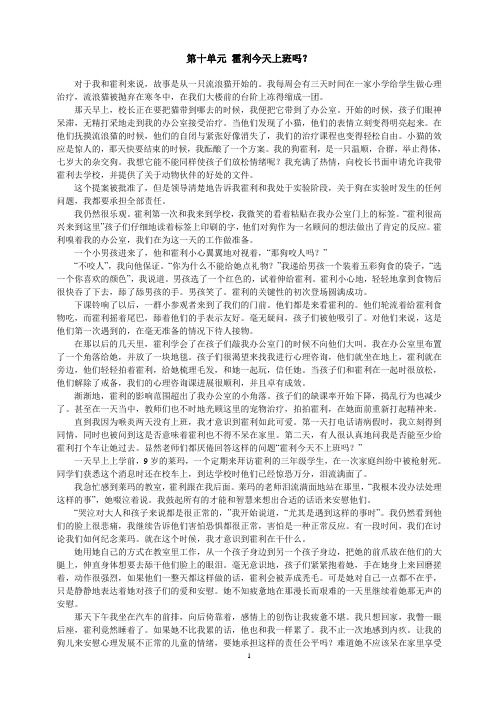
第十单元霍利今天上班吗?对于我和霍利来说,故事是从一只流浪猫开始的。
我每周会有三天时间在一家小学给学生做心理治疗,流浪猫被抛弃在寒冬中,在我们大楼前的台阶上冻得缩成一团。
那天早上,校长正在要把猫带到哪去的时候,我便把它带到了办公室。
开始的时候,孩子们眼神呆滞,无精打采地走到我的办公室接受治疗。
当他们发现了小猫,他们的表情立刻变得明亮起来。
在他们抚摸流浪猫的时候,他们的自闭与紧张好像消失了,我们的治疗课程也变得轻松自由。
小猫的效应是惊人的,那天快要结束的时候,我酝酿了一个方案。
我的狗霍利,是一只温顺,合群,举止得体,七岁大的杂交狗。
我想它能不能同样使孩子们放松情绪呢?我充满了热情,向校长书面申请允许我带霍利去学校,并提供了关于动物伙伴的好处的文件。
这个提案被批准了,但是领导清楚地告诉我霍利和我处于实验阶段,关于狗在实验时发生的任何问题,我都要承担全部责任。
我仍然很乐观。
霍利第一次和我来到学校,我微笑的看着粘贴在我办公室门上的标签。
“霍利很高兴来到这里”孩子们仔细地读着标签上印刷的字,他们对狗作为一名顾问的想法做出了肯定的反应。
霍利嗅着我的办公室,我们在为这一天的工作做准备。
一个小男孩进来了,他和霍利小心翼翼地对视着,“那狗咬人吗?”“不咬人”,我向他保证。
“你为什么不能给她点礼物?”我递给男孩一个装着五彩狗食的袋子,“选一个你喜欢的颜色”,我说道。
男孩选了一个红色的,试着伸给霍利。
霍利小心地,轻轻地拿到食物后很快吞了下去,舔了舔男孩的手。
男孩笑了。
霍利的关键性的初次登场圆满成功。
下课铃响了以后,一群小参观者来到了我们的门前。
他们都是来看霍利的。
他们轮流着给霍利食物吃,而霍利摇着尾巴,舔着他们的手表示友好。
毫无疑问,孩子们被他吸引了。
对他们来说,这是他们第一次遇到的,在毫无准备的情况下待人接物。
在那以后的几天里,霍利学会了在孩子们敲我办公室门的时候不向他们大叫。
我在办公室里布置了一个角落给她,并放了一块地毯。
最新现代大学英语第二版精读lesson9翻译答案

Unit 9Part 11. I have to go to the dentist. One of my front teeth is loose.2. Your translation is a bit too loose. You ought to be more faithful to the original.3. Fashions come and go. A few years ago everybody waswearing tight jeans, but now loose shirts and pants are back. 4. Many villagers actually did not like the terrorists, but they had toagree to harbor them because they knew if they didn't, they would be severely punished,5. After the civil war, many black people were still subjected to serious racial discrimination. They still could not count on the government to render assistance to them.6. Traditionally women were confined to their homes, deprived ofthe opportunity to seek employment. But in the course of the war, many women were obliged to go to factories to replace them, and this began to awaken women's social consciousness.7. Man is the only animal that makes a moral distinction betweenright and wrong. Man alone is capable of dreaming about how to make a paradise on earth of the existing world.8. Many towns and cities have lost their traditional beauty. But Pingyao is an exception in that respect. Ironically, it has been able to retain its beauty because for years it was too poor to change.9. She is one of the most important writers in contemporary China. She has published many works of distinction. But she still remains relatively unknown to people outside China, partly because we do not have enough talented translators to render such works adequately into foreign languages.Part 21. His dentist advised him to eat fruit and/but avoid sugar.2. Unlike its competitors, this grocery store never charges extra for residential delivery.3. Rachel Carson's style was clear, lively and informative but not preachy.4. There, production has dropped while prices and unemploymentrate have skyrocketed.5. Compared with the shop doorway he had slept in for a week, the man called the emergency shelter for the homeless a paradise.6. Unlike first-time homebuyers, those who own their houses have trouble getting a mortgage.7. Globalization is a double-edged sword. On the one hand, it maypromote economic growth, on the other hand, it may cause economic instability.8. She was repeatedly passed over for promotion while lessexperienced male colleagues were given managerial positions.9. He may not be the most talented software programmer, on theother hand he is the best for the project.10. What we have learned at college is merely a drop in the oceancompared with what is to learn in the medical field.。
创意阅读第二册Unit4-6
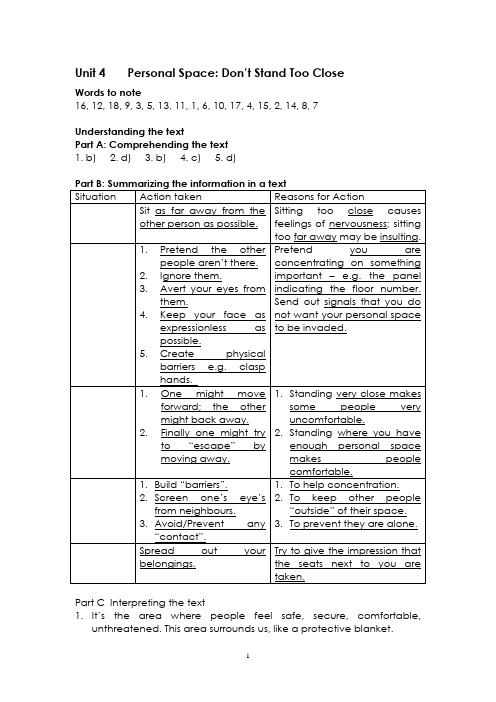
Unit 4 Personal Space: Don’t Stand Too CloseWords to note16, 12, 18, 9, 3, 5, 13, 11, 1, 6, 10, 17, 4, 15, 2, 14, 8, 7Understanding the textPart A: Comprehending the text1. b)2. d)3. b)4. c)5. d)Part C Interpreting the text1.It’s the area where people feel safe, secure, comfortable,unthreatened. This area surrounds us, like a protective blanket.2.In order to “protect” ourselves and to discourage any strangers from“invading” our personal space by attempting to make contact with us.3.Because we need to feel that this area is our own; it belongs to us;it’s part of our own self.4.When people from different cultural or geographical backgroundsare together.5.If attempts to preserve our personal space are ignored by others,and if we therefore feel a heightened sense of discomfort, threat or even danger, we might use force –e.g. a loud voice, or actual physical force, to make it very clear that we are “defending our territory”.Developing your skillsExtending your vocabularyPart A Synonyms and antonymsPart B Cloze sentences1. expressive2. indicated/show3. clusteredpliment5.gradually/slowly6.releaseUnit 5 Physical Disabilities: Overcoming Physical DisabilitiesWords to note2, 7, 8, 10, 1, 3, 12, 11, 5, 6, 13, 4, 14, 9Understanding the textPart B: Interpreting the textDeveloping your skillsExtending your vocabularyUnit 6 Robert Burns: A Poet of the People: Robert Burns Words to note4, 7, 1, 9, 13, 2, 11, 15, 5, 17, 6, 18, 3, 8, 10, 14, 12, 16 Understanding the textPart B: Interpreting the text2.What is love?Love is beautiful. It’s “like the melody”. “That’s sweetly played in tune.”It’s like beautiful flower –“a red, red rose”. It’s constant and eternal. What is friendship?Friendship means sharing – both “lovely” and “wearing” experiences. It means pleasant memories, and trust. (“There’s my hand, my trustedfriend, …”) it means constancy – when they can no longer climb “the hill together” they will “totter down … hand in hand …”. It is “one of the finest things life can bring”.Developing your skillsPart A: Familiarizing yourself with the features of poetry1.He believes that love is a fundamental blessing in life. There are many varied aspects in love: burns loved his country (Scotland), women, “humanity and honest, simple goodness”, friendship, trust, sharing, etc. further, he believed in morality, and fairness – he wrote about poverty and weakness and sadness.He had such a philosophy because his own childhood 0 his family was poor and he had to work hard even as a child, but he was given love and encouragement –perhaps influenced his feeling about life, and about the value and importance of the “common people”.3. 4. 5. (Omit)Expanding your vocabularyPart A: Description of happiness2. delighted, pleased, excited, glad, cheerful, merry, joyful, sunny3. jump for joy, walking on air, over the moon on cloud nine, as happy as a …Part B: Using contrast descriptions1.depressed, sad, unhappy, gloomy, miserable, sorrowful, sorry,heavily-hearted, low-spirited2.down in the dumps, down in the mouth, feeling blue。
大学英语精读第二册UnitNine课文详解
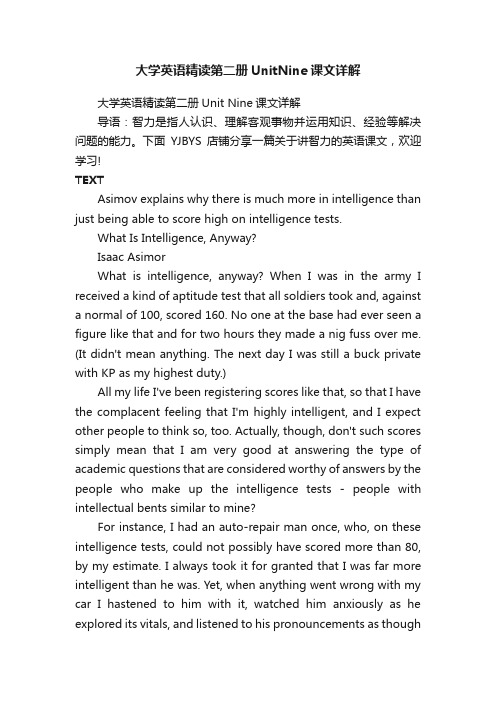
大学英语精读第二册UnitNine课文详解大学英语精读第二册Unit Nine课文详解导语:智力是指人认识、理解客观事物并运用知识、经验等解决问题的能力。
下面YJBYS店铺分享一篇关于讲智力的英语课文,欢迎学习!TEXTAsimov explains why there is much more in intelligence than just being able to score high on intelligence tests.What Is Intelligence, Anyway?Isaac AsimorWhat is intelligence, anyway? When I was in the army I received a kind of aptitude test that all soldiers took and, against a normal of 100, scored 160. No one at the base had ever seen a figure like that and for two hours they made a nig fuss over me. (It didn't mean anything. The next day I was still a buck private with KP as my highest duty.)All my life I've been registering scores like that, so that I have the complacent feeling that I'm highly intelligent, and I expect other people to think so, too. Actually, though, don't such scores simply mean that I am very good at answering the type of academic questions that are considered worthy of answers by the people who make up the intelligence tests - people with intellectual bents similar to mine?For instance, I had an auto-repair man once, who, on these intelligence tests, could not possibly have scored more than 80, by my estimate. I always took it for granted that I was far more intelligent than he was. Yet, when anything went wrong with my car I hastened to him with it, watched him anxiously as he explored its vitals, and listened to his pronouncements as thoughthey were divine oracles - and he always fixed my car.Well, then, suppose my auto-repair man devised questions for an intelligence test. Or suppose a carpenter did, or a farmer, or, indeed, almost anyone but an academician. By every one of those tests, I'd prove myself a moron. And I'd be a moron, too. In a world where I could not use my academic training and my verbal talents but had to do something intricate or hard, working with my hands, I would do poorly. My intelligence, then, is not absolute. Its worth is determined by the society I live in. Its numerical evaluation is determined by a small subsection of that society which has managed to foist itself on the rest of us as an arbiter of such matters.Consider my auto-repair man, again. He had a habit of telling me jokes whenever he saw me. One time he raised his head from under the automobile hood to say: "Doc, a deaf-and-dumb guy went into a hardware store to ask for some nails. He put two fingers together on the counter and made hammering motions with the other hand. The clerk brought him a hammer. He shook his head and pointed to the two fingers he was hammering. The clerk brought him nails. He picked out the sizes he wanted, and left. Well, doc, the next guy who came in was a blind man. He wanted scissors. How do you suppose he asked for them?"I lifted my right hand and made scissoring motions with my first two fingers. Whereupon my auto-repair man laughed heartily and said, "Why, you dumb fool, he used his voice and asked for them." Then he said, smugly, "I've been trying that on all my customers today." "Did you catch many?" I asked. "Quite a few," he said, "but I knew for sure I'd catch you." "Why is that?" I asked. "Because you're so goddamned educated, doc, I know you couldn't be very smart."And I have an uneasy feeling he had something there. NEW WORDSaptituden. natural ability or skill 能力,才能normaln. the usual state or level 正常的状态或水平figuren. 数字fussn. unnecessary expression of excitement, anger, impatience, etc. 大惊小怪buck privaten. (sl.) common soldier of the lowest rank 列兵KP (abbr)kitchen police (a military duty of helping the cooks prepare and serve the food, wash the dishes, and clean up the kitchen) 炊事值勤(员)registervt. achieve; write in a list or record 取得;登记complacenta. self-satisfactory; pleased with oneself 自满的;自鸣得意的highlyad. to a great degree; verysimplyad. just; only 仅仅;只不过academica. scholarly, theoretical, not practical; of a college or university 学术的,学究的;学院的worthy (of)a. deserving 值得的bentn. natural tendency or inclination 嗜好,倾向similara. alike; of the same sort 类似的auton. (short for) automobile 汽车estimaten. judgment or opinion about how much, how many, how good, etc. 估计grantvt. give or allow (what is asked for) 授予;准予hastenvi. go fast; be quick 赶快;急忙explorevt. search or examine thoroughly 探索;探究vitalsn. essential parts of anything; the main bodily organs 主要部件;(人体的)重要器官pronouncementn. formal or authoritative statement; opinion 声明;见解divinea. coming from God; sacred 神的;神圣的oraclen. 圣言;神谕devisevt. think out; plan 想出;设计carpentern. 木匠academiciann. member of an art, literary or scientific academy or society院士,学会会员morronn. stupid person 低能者;蠢人verbala. complicated with words and their use; spoken, not written 词语的;口头的intricatea. complicated 错综复杂absolutea. not measured by comparison with other things 绝对的'determinevt. fix or find out exactly 确定numericaln. of a number; shown by numbers 数字的;用数字表示的evaluationvt. 估价,评价evaluatevt.subsectionn. part of a section 小组,分部foistvt. force (sth.) on another person by fraud or trickery 把...强加于arbitern. judge 仲裁人,公断人joken. sth. said or done to cause laughter or amusementautomobilen. 汽车hoodn. (汽车)引擎罩doc(short for) doctordeafa. unable to hear 聋的dumba. unable to speak; stupid 哑的;愚笨的deaf-and-dumba. unable to hear and speakhardwaren. metal goods such as utensils, tools, nails, etc. 金属器具hammern. 锤子;榔头v. strike repeatedly (with a hammer)clerkn. salesclerk; person who works in a shop selling things 店员scissorsn. 剪刀scissorv. cut with scissorswhereuponad. upon, at, or after which 于是,因此;然后heartilyad. 尽情地smuglyad. complacently 沾沾自喜地goddamnedad. (sl.) very, extremelyuneasya. awkward; not easy in mind or body 局促的;不安的;不安适的PHRAESE & EXPRESSIONSmake a fuss of / over为...大惊小怪worthy ofdeserving 值得make upprepare ready for use 编制;配制by one's estimate据某人估计take sth. for grantedregard it as true or as certain to happen 认为某事当然go wrongstop working as true or as certain to happen 出毛病pick outselect 挑选try...on在...身上试验for surefor certain; certainly 确切地;肯定PROPER NAMESIsaac Asimov艾萨克.阿西莫夫。
Unit9Whatishappiness课文翻译综合教程二

Unit9Whatishappiness课文翻译综合教程二Unit 9 What Is Happiness?John Ciardi(abridged)The right to pursue happiness is issued to Americans with their birth certificates, but no one seems quite sure which way it runs. It may be we are issued a hunting license but offered no game. Jonathan Swift seemed to think so when he attacked the idea of happiness as “the possession of being well-deceived,” the felicity of being “a fool among knaves.” For Sw ift saw society as Vanity Fair, the land of false goals.It is, of course, un-American to think in terms of fools and knaves. We do, however, seem to be dedicated to the idea of buying our way to happiness. We shall all have made it to Heaven when we possess enough.And at the same time the forces of American commercialism are hugely dedicated to making us deliberately unhappy. Advertising is one of our major industries, and advertising exists not to satisfy desires but to create them —and to create them fa ster than any man’s budget can satisfy them. For that matter, our who le economy is based on a dedicated insatiability. We are taught that to possess is to be happy, and then we are made to want. We are even told it is our duty to want. It was only a few years ago, to cite a single example, that car dealers across the country were flying banners that read "You Auto Buy Now." They were calling upon Americans, as an act approaching patriotism, to buy at once, with money they did not have, automobiles they did not really need, and which they would be required to grow tired of by the time the next year’s models were released.Or look at any of the women’s magazines. There, as Bernard DeVoto once pointed out, advertising begins as poetry in the front pages and ends as pharmacopoeia and therapy in the back pages. The poetry of the front matter is the dream of perfect beauty. This is the baby skin that must be hers. These, the flawless teeth. This, the perfumed breath she must exhale. This, the sixteen-year-old figure she must display at forty, at fifty, at sixty, and forever.Once past the vaguely uplifting fiction and feature articles, the reader finds the other face of the dream in the back matter. This is the harness into which Mother must strap herself in order to display that perfect figure. These, the chin straps she must sleep in. This is the salve that restores all, this is her laxative, these are the tablets that melt away fat, these are the hormones of perpetual youth, these are the stockings that hide varicose veins.Obviously no half-sane person can be completely persuaded either by such poetry or by such pharmacopoeia and orthopedics. Yet someone is obviously trying to buy the dream as offered and spending billions every year in the attempt. Clearly the happiness-market is not running out of customers, but what are they trying to buy?The idea "happiness," to be sure, will not sit still for easy definitions: the best one can do is to try to set some extremes to the idea and then work in toward the middle. T o think of happiness as acquisitive and competitive will do to set the materialistic extreme. To think of it as the idea one senses in, say, a holy man of India will do to set the spiritual extreme. That holy man’s ideal of happiness is in needing nothing from outside himself. In wanting nothing, he lacks nothing. He sits immobile, rapt in contemplation, free even of his own body.7 Or nearly freeof it. If devout admirers bring him food, he eats it; if not, he starves indifferently. Why be concerned? What is physical is an illusion to him. Contemplation is his joy and he achieves it through a fantastically demanding discipline, the accomplishment of which is itself a joy within him.But, perhaps because I am Western, I doubt such catatonic happiness, as I doubt the dreams of the happiness-market. What is certain is that his way of happiness would be torture to almost any Western man. Yet these extremes will still serve to frame the area within which all of us must find some sort of balance. Thoreau —a creature of both Eastern and Western thought —had his own firm sense of that balance. His aim was to save on the low levels in order to spend on the high.Possession for its own sake or in competition with the rest of the neighborhood would have been Thoreau’s idea of the low levels. The active disciplin e of heightening one’s perception of what is enduring in nature would have been his idea of the high.10 What he saved from the low was time and effort he could spend on the high. Thoreau certainly disapproved of starvation, but he would put into feeding himself only as much effort as would keep him functioning for more important efforts.Happiness is never more than partial. There are no pure states of mankind. Whatever else happiness may be, it is neither in having nor in being, but in becoming. What the Founding Fathers declared for us as an inherent right, we should do well to remember, was not happiness but the pursuit of happiness. What they might have underlined, could they have foreseen the happiness-market, is the cardinal fact that happiness is in the pursuit itself, in the meaningful pursuit of what is life-engaging and life-revealing, which is to say, in the idea of becoming. Anation is not measured by what it possesses or wants to possess, but by what it wants to become.。
Unit 9 What is happiness课文翻译综合教程二
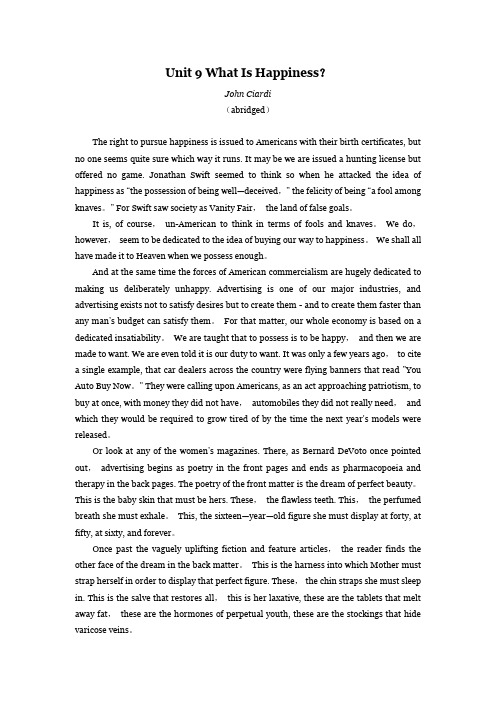
Unit 9 What Is Happiness?John Ciardi(abridged)The right to pursue happiness is issued to Americans with their birth certificates, but no one seems quite sure which way it runs. It may be we are issued a hunting license but offered no game. Jonathan Swift seemed to think so when he attacked the idea of happiness as “the possession of being well—deceived,” the felicity of being “a fool among knaves。
” For Swift saw society as Vanity Fair,the land of false goals。
It is, of course,un-American to think in terms of fools and knaves。
We do,however,seem to be dedicated to the idea of buying our way to happiness。
We shall all have made it to Heaven when we possess enough。
And at the same time the forces of American commercialism are hugely dedicated to making us deliberately unhappy. Advertising is one of our major industries, and advertising exists not to satisfy desires but to create them - and to create them faster than any man’s budget can satisfy them。
创意阅读第四册翻译
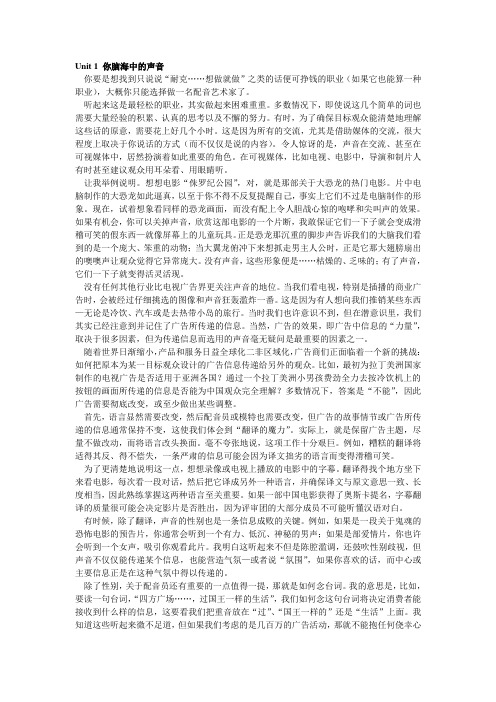
Unit 1 你脑海中的声音你要是想找到只说说“耐克……想做就做”之类的话便可挣钱的职业(如果它也能算一种职业),大概你只能选择做一名配音艺术家了。
听起来这是最轻松的职业,其实做起来困难重重。
多数情况下,即使说这几个简单的词也需要大量经验的积累、认真的思考以及不懈的努力。
有时,为了确保目标观众能清楚地理解这些话的原意,需要花上好几个小时。
这是因为所有的交流,尤其是借助媒体的交流,很大程度上取决于你说话的方式(而不仅仅是说的内容)。
令人惊讶的是,声音在交流、甚至在可视媒体中,居然扮演着如此重要的角色。
在可视媒体,比如电视、电影中,导演和制片人有时甚至建议观众用耳朵看、用眼睛听。
让我举例说明。
想想电影“侏罗纪公园”,对,就是那部关于大恐龙的热门电影。
片中电脑制作的大恐龙如此逼真,以至于你不得不反复提醒自己,事实上它们不过是电脑制作的形象。
现在,试着想象看同样的恐龙画面,而没有配上令人胆战心惊的咆哮和尖叫声的效果。
如果有机会,你可以关掉声音,欣赏这部电影的一个片断,我敢保证它们一下子就会变成滑稽可笑的假东西—就像屏幕上的儿童玩具。
正是恐龙那沉重的脚步声告诉我们的大脑我们看到的是一个庞大、笨重的动物;当大翼龙俯冲下来想抓走男主人公时,正是它那大翅膀扇出的噢噢声让观众觉得它异常庞大。
没有声音,这些形象便是……枯燥的、乏味的;有了声音,它们一下子就变得活灵活现。
没有任何其他行业比电视广告界更关注声音的地位。
当我们看电视,特别是插播的商业广告时,会被经过仔细挑选的图像和声音狂轰滥炸一番。
这是因为有人想向我们推销某些东西—无论是冷饮、汽车或是去热带小岛的旅行。
当时我们也许意识不到,但在潜意识里,我们其实已经注意到并记住了广告所传递的信息。
当然,广告的效果,即广告中信息的“力量”,取决于很多因素,但为传递信息而选用的声音毫无疑问是最重要的因素之一。
随着世界日渐缩小,产品和服务日益全球化二非区域化,广告商们正面临着一个新的挑战:如何把原本为某一目标观众设计的广告信息传递给另外的观众。
新标准大学英语2unit9译文和答案

Book 2 Unit 9 Active Reading 1New words1. caterv. to provide food and drinks at an eventComplete the sentences with appropriate prepositions.(1) Football fans are well catered _for_.(2) The TV shows are catering _to_ old audiences.(3) The school aims to cater _for_ children of all abilities.Do you know the difference between these phrases?cater for sb./sth. to provide people with everything they want or needcater to sb./sth. to provide people with something they want or need, especially something unusual or special2. dreadv. to feel very worried about sth. that might happen or is going to happenComplete the sentences with the words in the column.dread (n./v.) dreaded dreadful dreadfully(1) John felt _dreadfully_ tired.(2) I hear the _dreaded_ Miss Jones is going to be at the meeting.(3) It’s a _dreadful_ shame that you can’t go.(4) She started to _dread_ seeing him.(5) He lives in _dread_ of meeting her again.3. numerousa. existing in large numbers; manyFigure out the meaning of underlined words.(1) The car was seen in the area on numerous occasions . 多次(2)I’ve made mistakes too numerous to mention. 多得数不清4. optionn. something that you can choose in a particular situationTranslate the following sentences.(1)她没有别的选择,只好承认了实情。
英语9-12单元2b,2d翻译

整理ppt
8
此课件下载可自行编辑修改,供参考! 感谢您的支持,我们努力做得更好!
我认为今天的学校郊游非常糟糕。我们乘火车去 了博物馆。在缓慢的火车上很热。博物馆又大又无聊。 一切都是关于机器人的,我对那方面不感兴趣。房间 真的很暗而且拍照很难,因此我没有拍。也有太多的 人,并且我真的不能看到或听到导游。礼品店里的东 西如此昂贵。我一点也不喜欢这次郊游。
整理ppt
6
12单元2d
❖ 2d: ❖ 嗨,莉萨,你的周末过得怎么样? ❖ 好极了,谢谢。 ❖ 你做什么了? ❖ 我在自然历史博物馆里当导游。 ❖ 真的吗?多么有趣啊! ❖ 是的,那是一件愉快的事。他们有一个有200多种蝴蝶的房
子。我向游客讲述蝴蝶及他们的生活习惯。你过了一个愉快 的周末吗? ❖ 是的,挺好的,但是我现在有点累。为了看足球赛 ❖ 我熬到深夜。
整理ppt
2
10单元2d
2d: 下午好,请问您可以点菜了吗? 是的,牛肉汤里有蔬菜吗? 是的,有一些西红柿。 好吧,我们想要一碗牛肉汤。 当然可以。要多大碗的 请来大碗的。 我们还要宫保鸡丁和一些带有米饭的麻婆豆腐。 好的,一份大碗牛肉汤,一份宫保鸡丁和一份带有米饭的
麻婆豆腐。 是的,你说的对。
5
11单元2b
6月15日 今天我去学校郊游了。我们参观了科学博物馆。并
且它真的很有趣。我们乘火车很快就到达了那里。沿 途我们看到了一些农场和村庄。在博物馆,;了解了 许多关于机器人的知识。我不知道它们能和我们一起 下棋。天气是如此凉快!然后,导游教我们怎样制作 一个机器人模型。我也拍了许多好照片。后来,我去 了礼品商店并为我的父母买了一些可爱的礼物。它们 价格不贵。总的来说,这事令人兴奋的一天。 6月15日
- 1、下载文档前请自行甄别文档内容的完整性,平台不提供额外的编辑、内容补充、找答案等附加服务。
- 2、"仅部分预览"的文档,不可在线预览部分如存在完整性等问题,可反馈申请退款(可完整预览的文档不适用该条件!)。
- 3、如文档侵犯您的权益,请联系客服反馈,我们会尽快为您处理(人工客服工作时间:9:00-18:30)。
Unit9平衡问题下面是位中学老师罗恩·布莱克和另一所学校的一位七年级学生劳拉·汤普生的谈话记录。
罗恩:劳拉,你认为怎样才算是好老师?劳拉:我认为最重要的是热情和对学生的兴趣。
学校的孩子总能知道老师够格不够格。
老师要是对孩子没兴趣,她不可能有热情,这是很明白的事。
他们总会知道老师是否站在他们一边。
老师还得了解她这份工作的方方面面。
要是老师不合格或对自己这门课不懂,学生不可能相信她的能力,我想我说的是学生还是对老师有信任感。
罗恩:我同意。
劳拉:她还得有条不紊,有自信心,不然她会管不住学生。
孩子们说话,瞎混,课堂便成了他们消磨时光的地方。
其实,大多数孩子不喜欢没纪律的课堂。
他们需要引导。
大多数孩子不想胡闹,但假如老师对他们的胡来听之任之,他们会控制不住自己——学生会一发不可收,毁掉每堂课。
对于,她得严格,有纪律,让学生明白谁是上司。
她要有幽默感是最好不过的。
这很要紧。
我想她还得有点表演才能,让课堂活起来。
她如能让孩子们笑起来,那也是让孩子旦目白她理解他们的一种手段。
罗恩:嗯。
劳拉:还有,最糟糕的是老师的幽默感不对,她的笑话让孩子们笑不起来。
我很难讲得很具体,因为每个老师的情况不—样。
我刚才谈到的好的老师的情况,差的老师身上也有。
比如他们有热情,业务精通,就是没和孩子们沟通起来。
我们学校有位老师上课逗得很,好玩极了。
从她开门进教室到下课出门,我们就笑个没完,就是没学到东西。
时间都用在笑上了。
真的,下了课我们的颌都疼了,但我们的学习从没有走上正路。
说实在话,我们并不满意这类课,虽然我们喜欢去。
你明白我的意思吗?罗恩:我想我懂你的意思。
劳拉:有时,你遇到的老师真够严厉的,让人受不了,学生们还是喜欢她,因为他们学得辛苦,也学到了东西。
他们也就接受这些规矩,不笑也不胡闹,因为他们知道她很认真。
能跟她长知识。
你怎么看?同意我的观点吗?罗恩:我同意你的观点。
你说的全是实话。
人与人不同,连下课后的老师与上课时的老师都不一样。
回想我的上学经历,和你讲的—样。
比方说合格的问题。
我记得我的数学老师,和很多人一样,是战后当的老师。
那时老师不够,却有不少年纪轻轻的人,他们因战争没上到学,说真的干什么都不够格,因为他们战时该在上学却把时间荒废了。
所以他们进了教学速成班——约三个月——随后把他们安在教室里。
艾奥里——那数学老师的名字,至是我们给他的绰号——就是速成班成员之一,没有教数学的资格。
可他是我最好的老师,我的同学都有同样的感受。
我们都尊重他的能力。
我们喜欢他的课,从没有人在课堂上胡闹——他从来不用提高嗓门。
我们比所谓的好班学得更快,但没人想升到尖子班,因为没人想离开艾奥里的班。
好啦。
也许我可以问你个问题了:怎么做个好学生?劳拉:这个嘛,或许你比我更有发言权,你得教学生,但我看他们的角度不同。
我认识的向学几乎都是我的朋友,也许我还没你看得清楚。
不论如何;我谈谈我的看法。
你知道,有的人自然而然地学习,不用特别刻苦。
他们也许学得好也许学得差。
好学生首先是想学。
其次他们有好的学习方法——他们得知道在课上课后怎么学。
但他们不应对学习过于认真,除了学习什么也没有。
他们应有别的兴趣,和别的人一起活动,无论是体育活动,还是别的活动,比如去电影院、下棋什么的,或就和班里同学或朋友一起玩;他们也应和别人一起开怀大笑。
你的观点呢?罗恩:呃,我想你说的这类学生听起来蛮不错——过于认真不好,也不必太聪明,但他们应对事物感兴趣。
老师喜欢的是问问题的学生,至少是那些问好问题的学生,往往这些问题也是别人的问题,它使得老师有机会按学生理解的方式来解释。
老师没把内容讲明白时尤其如此。
老师最讨厌一个个呆头呆脑的学生——他们在课堂上死不吭声,你一辈子搞不懂他们是真懂还是假懂。
别的嘛?对丁,有的学生自作聪明,要表现自己,经常在别的同学面前以为自己“无所不知”。
他们令人生厌。
他们和问问题的学生不同,因为他们真的什么也不懂。
他们在帮助老师推进教学方面起不了什么作用。
劳拉:老师都这样看待好学生吗?罗恩:不,不。
我想有老师喜欢班上有“听话的学生”,有“无所不知的学生”,来向他人表白至少有人在学习。
我觉得这样的老师只教育最好的学生,不关心落后的学生。
一个好老师应尽力去教育她所有的学生,不只是最聪明的学生或只是差等生。
教学是种平衡行为,方式多种多样,这是方法之一。
劳拉:你是说在太严肃认真和太多胡闹之间应有个平衡?罗恩:说到点子上了。
关键就是个平衡。
在一定意义上学生也一样。
当然,这对他们也不一样,因为他们不是成人,个性和处世方式还没定型。
但是最好的学生都表现出一种平衡,不太急于求成,也不太对啥事都没劲,不过分认真,也不过分狂热,既不喋喋不休,也不静得像老鼠。
劳拉:嗯,我要注意点自己的平衡问题。
罗恩.我们每个人都该这样,劳拉……Unit10“第六感觉”的科学性第一批白人来到萨摩亚岛,他们发现盲人用手握着东西就能把它们详细地描述出来。
就在一战后的法国,朱尔斯@罗曼测试了数以百计的盲人,发现有几个能分辨出深色和浅色。
经过无数次测试,他发现他们是用鼻子或手指头:在“看”。
在意大利。
科学家西泽·罗姆布罗索发现一位盲女能用鼻尖或左耳垂“看”东西。
—束亮光突然照到她耳朵上,她会把头扭开,似有疼痛感。
1956年,一位苏格兰盲学生学习识别不同的彩色光线,学会能捡起几英尺之外的色彩鲜艳的东西。
1960年一个医疗组测试一位弗吉尼亚州女孩,发现即使给她眼睛蒙上绷带,贴上胶布,她还是能辨别颜色,识读少部分印得大的字。
可能的例子数以千计,但这里为数不多的几个例子足以表明“不用眼睛的视力”显然不是新鲜事。
但是,来自俄罗斯的一位山村女人的感觉能力达到了前所未有的顶点。
这似乎令人难以置信,罗莎·库利肖娃真的能用手指头看东西。
我们经常读到的案例是某一个感官的缺陷,作为一种弥补,别的感官尤其发达。
可罗莎不是盲女,而是出生在盲人家庭,学会了盲文,从此学会了用手去做一些不可思议的事情。
1962年,她的医生带她去莫斯科,在那里她接受了苏联科学院的检查,至少在俄罗斯一下子出了名。
一位叫谢夫的科学家对她进行了认真的研究,发现即使把她的眼睛牢牢蒙住,仅让手臂穿过屏风,她只要触摸一下就能辨认出三种不同的颜色。
为了检测不同颜色的卡片对热的反射也不同,谢夫把有的加热,把有的冷却。
这都没有影响她的反应。
他还发现她能隔着玻璃读报纸,这样她的触觉没给她读报提供帮助。
她接受一位心理学家测试时,把不同颜色的光照在她的手上,她能鉴定出光的不同颜色或光落在手上或屏风上的斑影。
在严格控制的测试里,用一块布条、一个屏风和一块很宽的卡片围着她的脖子隔住她的视线,但她还能用胳膊肘读字迹小的报纸。
最让人信服的测试是,一个人从背后死死地蒙住她的眼睛,她重复了所有这些试验。
这种情况下没人有本事作弊。
蒙她眼睛的手拿开后过了几分钟她都还很难看清楚。
罗莎在俄罗斯确实引起了不小的轰动。
在她之后又作了别的测试,结果发现六个人里有一个人只接受一小时训练后就能分辨出两种颜色的差异。
80个学生的班很快就组成了,接受“不用眼睛看”的训练。
他们承认不同颜色感觉起来稍有不同。
有的触摸起来光滑度不同。
黄色很滑,红色是粘的等等。
即使在这些颜色上压着玻璃,学生们也能“感觉到”颜色上方的空气不同。
这些学生不用布条蒙眼时视力绝好,所以常有人说他们作弊。
可在另一所学校,盲人在接受同样的训练。
很多盲人说上这些课时他们已意识到对不同的颜色他们有不同的“感觉”。
盲人班上水平更高的学员甚至在隔着金属板识别颜色。
他们能“看见”的颜色老师都看不见。
盲童用耳朵、舌头和脚尖“看”的事说明人体内没有特别的感应细胞在起作用。
但看的能力遍布全身,这是细胞的普通功能。
很清楚,光线的类型和强度不同,其影响细胞的方式也不同。
人们能学着体会这种不同,并分辨出不同种类的光。
这就解释了为什么俄罗斯人发现在强光下识别能力最强,而在光线暗淡时,和人的正常视力一样,这能力就减弱。
但无法解释的是,有人为什么能隔着铁板看,还有为什么如果把物体(或者人的手)通电后接地,这能力便消失了?这就是人们有时说的“第六感觉”。
事实上很清楚,我们还有个感觉,但没被开发出来。
第六感的说法常被嘲弄,只在傻乎乎的影片里看得见。
但如果人们以科学的方式来对待这个想法,那么其可能性是真实而又极为令人激动的。
再回到主题来,“不用眼睛的视力”能力在儿童身上最强,11岁时达到顶点。
人体似乎有—种与蝙蝠或鲸鱼相类似的系统:一种声纳系统,可以接收或传达信息,表达意义。
要是我们正常感官失灵,这个额外的感官就顶替上去协助别的感官。
而它可以在每个人的系统里,包括视力绝好的人。
它像猫的胡子,“感觉”我们周围的空间,给我们提供信息,让我们死里逃生。
不幸的是,过了十一岁,我们的大脑把我们的感官控制得更严,排斥这额外的信息,不再相信它。
换而言之,我们的“理性”或“智力”拒绝这美妙的功能,只是因为不理解,如同排斥其他不理解的功能一样。
也许将来还有希望,像罗莎@库利肖娃这样的人越来越多,我们的“理性”即使解释不了或不理解。
也能将它作为正常事物接受。
到那一天我们的生活会大为改善.真想像不出这对数以万计的盲人来说意味着什么。
我们需要的是更信任我们的能力,宁愿多相信一点我们的本能,少相信一点我们的理性。
Unit11诚心诚意地保佑自己世上每个社会,不管其有多“文明”,总有些信条与科学逻辑思维背道而驰。
这些信条被称之为迷信。
每个人在其一生中的某些时候都相信过迷信。
有些人几乎就依照着迷信在生活。
他们在做任何事情之前都要考虑此事会给他们带来好运还是厄运。
有些人,对在一周中的星期几几或一个月中的几号结婚、公司开张及驾照考试,都非常讲究。
有些人在某几天拒绝乘坐飞机。
中国传统上有很多迷信。
比如,人们非常相信生者与死者之间有密切的联系。
每年中都有几个节日来祭奠死者。
任何意外或谋杀而致的死亡事件,都为人们所惧怕,因为鬼魂会在人死后的第七天夜里回来,寻求复仇。
在中国新年,屋子大扫除可能会带来厄运。
当然,中国最大的迷信是:人们相信并重视“风水”。
在许多建筑物的设计及建造上,人们在关注精美的建筑设计的同时也非常在意好的“风水”。
人们对数字也很重视,主要是因为音调稍有不同的字会表示好运或厄运、长寿、富有等等。
通过这样一个事实,可见人们对数字的重视程度:在香港,买机动车辆牌号的钱有时是车辆价格的许多倍!当然,西方社会也有很多迷信说法。
英国最有名的迷信说法之一是:星期五是不幸运的日子——对海员尤其如此。
这一说法几乎肯定来自这个事实:据说耶稣是星期五死的。
英国海军司令部曾一度决定要证明这种说法纯属无稽之谈。
他们建了一艘船,是周五开工,周五完工的,并且也把该船命名为“星期五”。
他们甚至给船找的船长也姓“星期五”(Friday)而巳该船的首航也是在周五进行的。
